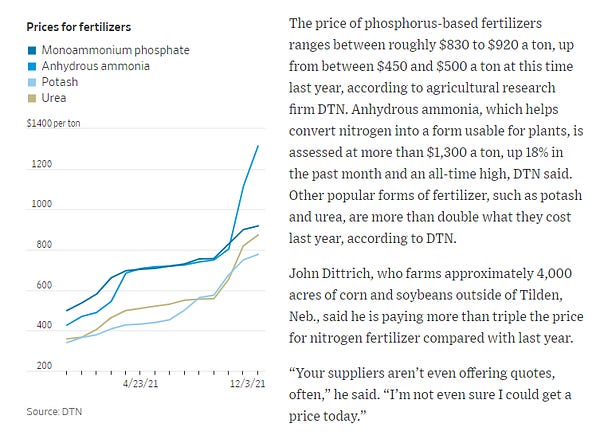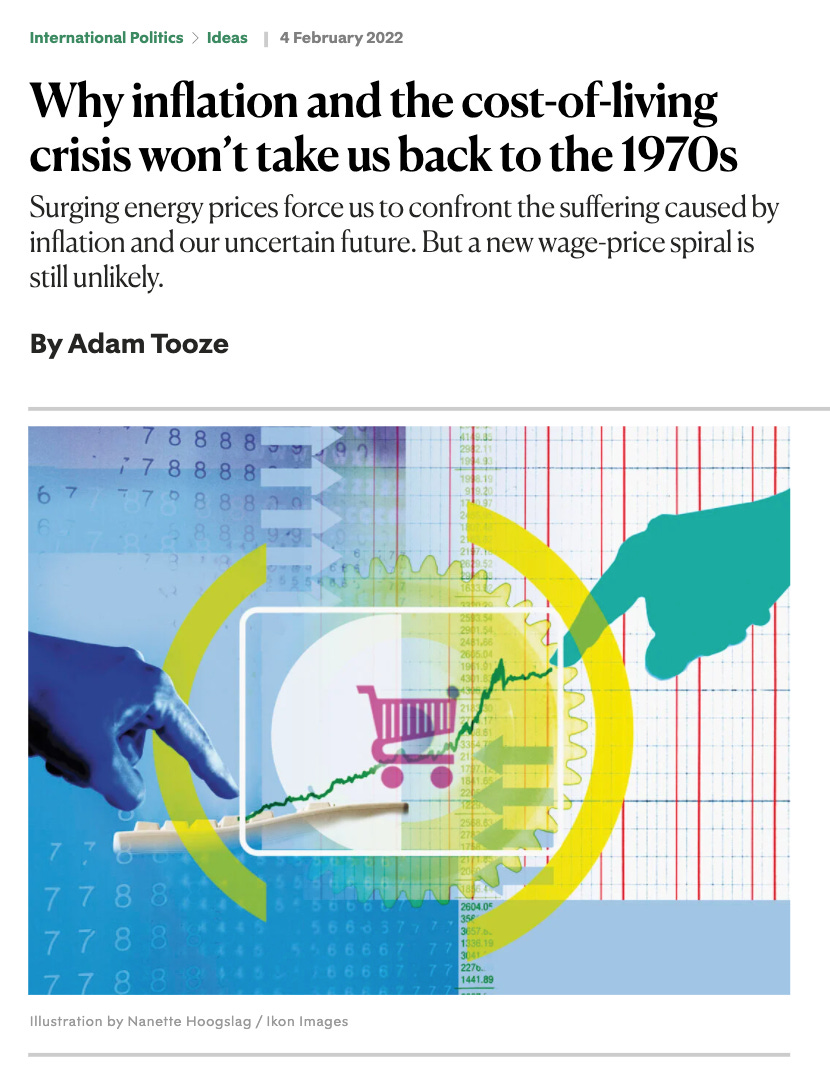Did a piece for the New Statesman that started out as a reflection on the fact that when prices change on a large scale, in a short space of time, what this delivers is not a neat and tidy “price signal”, as Friedrich Hayek famously imagined, but an information bomb.
I’ve been worrying away at this for a while, starting with my various musings about the politics of the energy price shock.
The latest New Statesman piece looks more generally at how price movements can be read (1) as relative price signals, (2) as part of a broader inflationary process, (3) as explicable in terms of sectoral political economy, (4) as a policy tool, (5) as drivers of a social crisis, (6) as indicators of the value of life, (7) as markers of class struggle and finally (8) as the harbinger of a new era of “idiosyncratic”, but systemic environmental shocks.
Hayek was certainly not wrong. They compress a lot of information!
Inexplicably, the New Statesman on publication removed all the links from the edit I sent them. Crazy! I’ll note here that I particularly liked James Meadway’s piece on inflation and environmental shocks.
We have learned a lot from the price shock. The current series of price surges has reminded of us key connections e.g. between fossil fuels, artificial fertilizer and food prices.


We have learned a LOT about supply chains and their impact on pricing. On this score, these paragraphs by Dean Baker are excellent.
The Bureau of Labor Statistics reports that the price index for final demand for transportation and warehousing services rose 16.6 percent last year. This is a cost that gets factored into the price of just about everything.
One example that shows the impact clearly is apparel. The index for apparel prices in the CPI rose 5.8 percent last year. The overwhelming majority of our apparel is imported, most of it from developing countries like China and Bangladesh. The index for the price of imports of apparel rose by 1.5 percent over the last year.
Presumably, most of the 4.3 percentage gap between the CPI index and the import price index is explained by higher transportation costs. If we can expect that at some point in 2022 that these supply chain problems will be overcome, then not only will apparel prices stop rising, but much of their increase in the last year will be reversed.
But, in the course of editing the New Statesman piece, what really blew up was left populist discourse in the UK about price hiking and gouging, especially in the discount food section. This campaign by Jack Monroe has had a huge impact.

It has sent economic journalists and the statisticians at the ONS scrambling to figure out how best measure the cost of living for the poor. See this piece by Tim Hartford, for instance.
And most remarkably it triggered a mea culpa by Claire Jones of the FT’s Alphaville, disowning the slogan “transitory inflation”.
We’re no longer “team transitory” because, regardless of your views on the labour market and semiconductor chips, we’ve come to realise how callous the phrase sounds. …. We’re ashamed that it took the thread for us to realise how insulting framing inflation as only “transitory” must’ve felt for people who are struggling to make ends meet. Transitory sounds blasé, like it’s only a blip. It implies it’s something that officials and journalists ought to “look through”, focusing more on the “medium term” and less on how higher prices in the here-and-now are impacting society’s most vulnerable.
Personally, I am unpersuaded by both the logic and the politics of this about face. But you have to take note. When an excellent financial journalist like Claire Jones writing in the pages of the FT fells compelled to make a move like this, it marks a moment in the development of the UK’s “moral economy”.
I’m unpersuaded because if we are talking about poverty, which Jack Monroe is - poverty as defined by the urgent search for the cheapest can of baked beans - then we should talk about poverty. And, no, that is not a transitory problem. But price controls on basics are not generally a good way of addressing poverty, except in emergencies where the apparatus of regulation is already in place (e.g. in current energy market shambles).
In the UK case, as the FT’s own analysis exposes, the Tory government’s response to the energy price shock is handing out largesse across the income distribution.
More generally the embrace of the discourse of the “cost of living crisis”, rather than alternative formulations like “the crisis of low pay”, or the “crisis of inadequate state benefits”, seems dangerous. It plays into the hands of inflation hawks. Tender concern for the cost of living of the struggling pensioner has long been a staple of conservative anti-inflation rhetoric. It is a close kin of the “householder fallacy” i.e. the idea that macroeconomic accounts are like household budgets and tightening belts is the way to meet a crisis.
The anti-inflation push right now is taking on the quality of a more broadly based conservative campaign. Andrew Bailey’s remarks about wage restraint let the cat out of the bag on that score.
As the Governor of the Bank of England told BBC radio, he
wants British workers to think again when they ask for an inflation-busting wage rise. “I’m not saying nobody gets a pay rise, don’t get me wrong, but I think, what I am saying, is we do need to see restraint in pay bargaining otherwise it will get out of control,”
This exposes one of the most profound hypocrisies in conventional talk about inflation, the asymmetrical treatment of the price of labour i.e. wages. If a central bank is truly committed to stabilizing the general price level, then it has no business lecturing any one particular actor on the need for restraint. Asking for wage restraint is literally asking for an allocative effect, one-sidedly, in favor of employers.
As Martin Sandbu puts it:

In the US, Jay Powell is getting in on the act too. This commentary by Josh Mason is predictably excellent.


In 2020 a lot of folks were asking, “where has austerity gone?” The smart answer was wait and see. After the GFC it took until 2010 for the real fight to begin. Well, here we are, right on time. 2022 may turn out to be the year that the hydra returns in earnest.
***
I love putting out Chartbook. I am particularly pleased that it goes out for free to thousands of subscribers around the world. Voluntary subscriptions from paying supporters sustain the effort. If you are enjoying the newsletter and would like to join the group of supporters, pick one of the options here.
And please do recommend Chartbook to a friend.






"I’m unpersuaded because if we are talking about poverty, which Jack Monroe is - poverty as defined by the urgent search for the cheapest can of baked beans - then we should talk about poverty. And, no, that is not a transitory problem. But price controls on basics are not generally a good way of addressing poverty, except in emergencies where the apparatus of regulation is already in place (e.g. in current energy market shambles). "
I view this as pretty much the same move as talking about the distributional effects of monetary policy but from a different angle. in principle i would subscribe to the "one fix at a time an specifically tailored to the problem"-principle but i think we see that political economy does not work this way and ignoring these distributional effects without cedible commitment to fixing the other problems which are ignored leads to not solving them at all.
"More generally the embrace of the discourse of the “cost of living crisis”, rather than alternative formulations like “the crisis of low pay”, or the “crisis of inadequate state benefits”, seems dangerous. It plays into the hands of inflation hawks. Tender concern for the cost of living of the struggling pensioner has long been a staple of conservative anti-inflation rhetoric. "
I think at the moment this talk does seems more plausible as most workers see the payment side of their balance sheet as fixed and feel the only mutable side is inflation. No realization that battling inflation implies slower growth with bad knock-on effects arguably worse than the current situation. On the one hand it speaks to not thinking in counterfactuals and marginal analysis (who would blame people for that?), but more importantly to the lost hope through the marginalization of unions / a real labour movement. Most just do not think it possible to get more income because of inflation, as this has not been lived experience in their lifetime.
Great post. Hipocrisy of Bailey. He is so depressing but also so transparent in his biases and his dreadful communication that he dispels the myth that Central Bankers are independent. Central Bankers are servants of capital. They are about as independent as any other industrialist.
When house prices and share prices were sky rocketing central bankers weren't worried about inflation. Only when that nonsense started feeding back into the real economy (ie wage increases) and politics that the Central Bankers started getting worried.
Try 18 months of higher longer term interest rates and see where everything that has been funding short goes. The problem they have now is that they cannot do anything with interest rates because we are at the end of another decade long credit bubble and popping that will push the economy back into recession. Therefore expect more stuff like this from Bailey and other Central Bankers but don't predict interest rates going above 2% for very long.